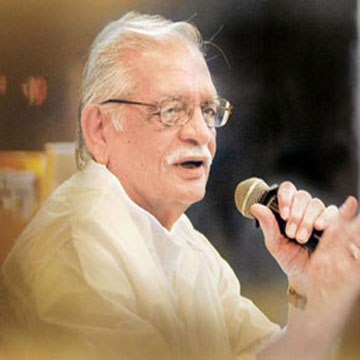 New Delhi:
New Delhi: I have written for Bollywood, I have written for poem lovers and readers, I have written for my daughter too but now I am writing for my grandson, says renowned poet and lyricist Gulzar.
"It is very difficult to learn and decipher the language of children. It is altogether a different literary world. Children's language is different when they are two, when they are seven and the process goes on. We should also have books written in their language," he said at the launch of his book titled "Boski ka Panchtantra" here recently.
"I learnt it when my daughter was growing up and I was writing books for her. Now I am writing for my 3-year-old grandson," he added.
"Bosky ka Panchtantra" is a set of 5 different books comprising of stories from Panchtantra. The stories are from Panchtantra but the words are of Gulzar. These stories were not written but told and are compiled in the book as he narrated them to his daughter Bosky when she was a kid.
The award winning lyricist-director was participating in the third edition of 'Samanvay', the Indian Languages Festival, which began at the India Habitat Centre, here on October 24.
According to Gulzar, in a country like India where so many different languages are spoken, no language or dialect can be uniform, it differs widely with different areas.
"Be it Hindi, Urdu or even English its not uniformly spoken here. It is different in Lucknow, its different in Delhi, its different everywhere," he said.
Even the Urdu that we speak in India is not the same as that spoken in Pakistan, there it has more of Sindh effect. Though the language here in India has also evolved like anything in past 50 years, said Gulzar.
"It is not necessary to have any uniformity in languages, but they should not be mixed. There should be no Hinglish, it should be either English or Hindi. Every language has its uniqueness, it gets lost when mixed with another," he said.
The four-day festival focusing on connections between the country's languages and dialects features features a line-up that includes Jerry Pinto, Ketan Mehta, Mahesh Bhatt, Mukul Kesavan, Piyush Mishra, Sanjay Kak, Shashi Deshpande, Shuddhbrata Sengupta and Varun Grover among others.
Beyond the language specific sessions, sessions on civil society, activism, dalit and women writing, alternative voices from literature, cinema, radio, publishing, gender violence, aspirations, dreams and voices of the marginalised have been featured.
 New Delhi: I have written for Bollywood, I have written for poem lovers and readers, I have written for my daughter too but now I am writing for my grandson, says renowned poet and lyricist Gulzar.
New Delhi: I have written for Bollywood, I have written for poem lovers and readers, I have written for my daughter too but now I am writing for my grandson, says renowned poet and lyricist Gulzar.